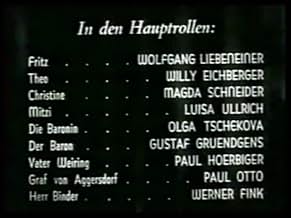Some films cannot be sufficiently qualified by superlatives, and this superb, tranquil, poetic masterpiece is one of them. This film is not just to be watched and enjoyed, but to be felt with all the senses.
Without ever becoming sentimental it tells a very moving love story, but there is a deeper meaning in it (of course already conceived by Arthur Schitzler). We see an artificial Vienna and rigid social rules, but what really is shown is a universal and timeless theme: misplaced (male) honour.
This "misplaced honour" is shown through various male characters, but the most devilish of them is Gustaf Gründgens (absolutely brilliant): was there ever a cigarette smoked as by Gründgens, concentrating all his anger and hate in his smoking. And here we have only one example of Ophüls' idea of letting the image speak: not by dialogue alone (sometimes unintelligible, but this is on purpose!), but by body and camera movement, lightning, editing, sets, the meaning of a scene is told.
This film is superb on all levels, but this is not the place to analyze further (and there are people who are much more capable to do that than I am). I just want to refer to the final sequence (starting with Beethoven's 5th): see how Ophüls, just by perfectly arranging Ullrich, Eichberger and Hörbiger opposite Schneider, gets an image that shows emotional desolation: the party is over, life is over (one must have seen the film to understand this remark) . This culminates in the long, extreme close up of Magda Schneider realizing and trying to come to terms with what has happened; one must have a heart of stone not to get tears into one's eyes or at least a lump in the throat, when seeing this scene. This scene was her moment of triumph; was she ever again as outstanding as in this scene?
Liebelei premiered after the Nazi take-over; it was banned, then - by popular demand - quickly showing was allowed again but only after the names of the jewish contributors were removed. It amazes to know that in 1945 it was banned by the Allies.






























